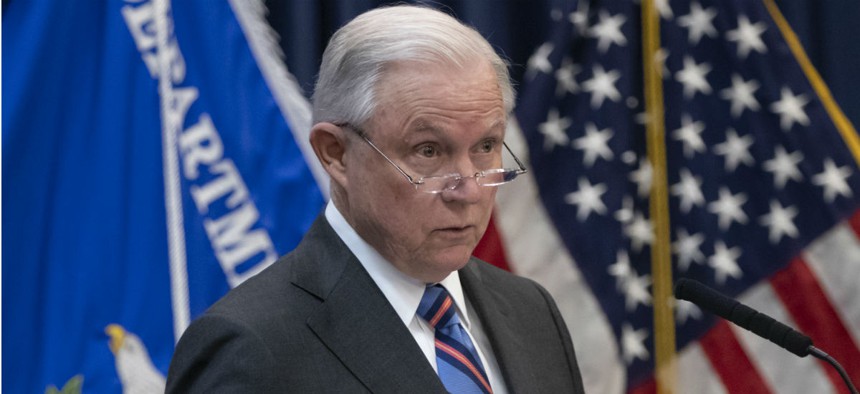Attorney General Acts on Promise to Hire More Immigration Judges
Sessions tells largest class of new judges to ignore resistance from “open borders” advocates.
Attorney General Jeff Sessions on Monday drew a sharp contrast between the Trump administration’s approach to illegal immigration and those of its predecessors during a ceremony to swear in 44 new immigration judges.
“As we work to restore rule of law in our immigration system, we will send a clear message to the world that the lawless practices of the past are over,” Sessions told a gathering at the Executive Office for Immigration Review in Falls Church, Va. “The world will know what our rules are, and great numbers will no longer undertake this dangerous journey.”
Sessions said his department now has “the most active immigration judges in history,” and named a goal of a 50 percent increase in sitting immigration judges since President Trump’s inauguration. There were 289 judges at the end of fiscal 2016 just before the start of the Trump administration, according to the Government Accountability Office. There are now 397, including the 44 sworn in, the Justice Department said.
He also highlighted his responsibility as attorney general to enforce the Immigration and Naturalization Act. “It is perfectly legitimate, moral and decent for a nation to have a legal system of immigration and to enforce the system it adopts,” he said. “No great and prosperous nation can have both a generous welfare system and open borders. Such a policy is both radical and dangerous. It must be rejected out of hand,” he said. “The INA is not perfect, but it plainly lays out a rational scheme for immigration that tells our officers and judges who is to be admitted, how many and under what circumstances.”
Sessions added: “The position you hold is not a 9-to-5 one–it is a professional position. As you take on this critically important role, I hope that you will be imaginative and inventive in order to manage a high-volume caseload. I do not apologize for expecting you to perform, at a high level, efficiently and effectively.”
The Homeland Security Department, the attorney general noted, is seeking to refer 100 percent of illegal border crossers to the Justice Department for criminal prosecution in federal courts. “Our U.S. Attorneys are prosecuting over 90 percent of those cases referred to us. It’s a two to threefold increase – and it has some deterrent effect,” Sessions said.
Sessions also criticized the Obama administration’s greater tolerance for asylum seekers, promising that under the Trump “zero tolerance” approach to border crossers, “The number of illegal aliens and the number of baseless claims will fall. A virtuous cycle will be created, rather than a vicious cycle of expanding illegality.”
The backlog of immigration court cases as of July 31 was 746,049, according to the Syracuse University Transactional Records Access Clearinghouse immigration report. The proposed budget for next year would bring the court up to 459-484 judges, according to the National Association of Immigration Judges.
Handling the rising backlog would require doubling the current number of judges, according to the association, which is also critical of Sessions’ approach. “We obviously have a lot of concerns about the tone and context of the attorney general’s remarks,” Immigration Judge Ashley Tabaddor, speaking as the group’s president, told Government Executive.
“It underscores the need for immigration to be moved from the Department of Justice, a prosecutorial agency, into a truly independent court,” she said. “The attorney general once again is acting as the nation’s top prosecutor, highlighting the executive branch prosecutorial police’s attempt to impose on a court system that is supposed to be an impartial arbiter. “
In addition, she said, Sessions “makes explicit that he’s putting quality over quality. He wants maximum production from judges,” but he encourages them to be imaginative in a way “he doesn’t seem to like in any other part of our jobs,” Tabaddor said.
“He never mentions due process but highlights his preconceived notions about attorneys before the court and the individuals they represent, painting them as active participants in undermining the integrity of the law,” she said. Such abuses of the process, she added, are not something that judges can bring to the courtroom.




